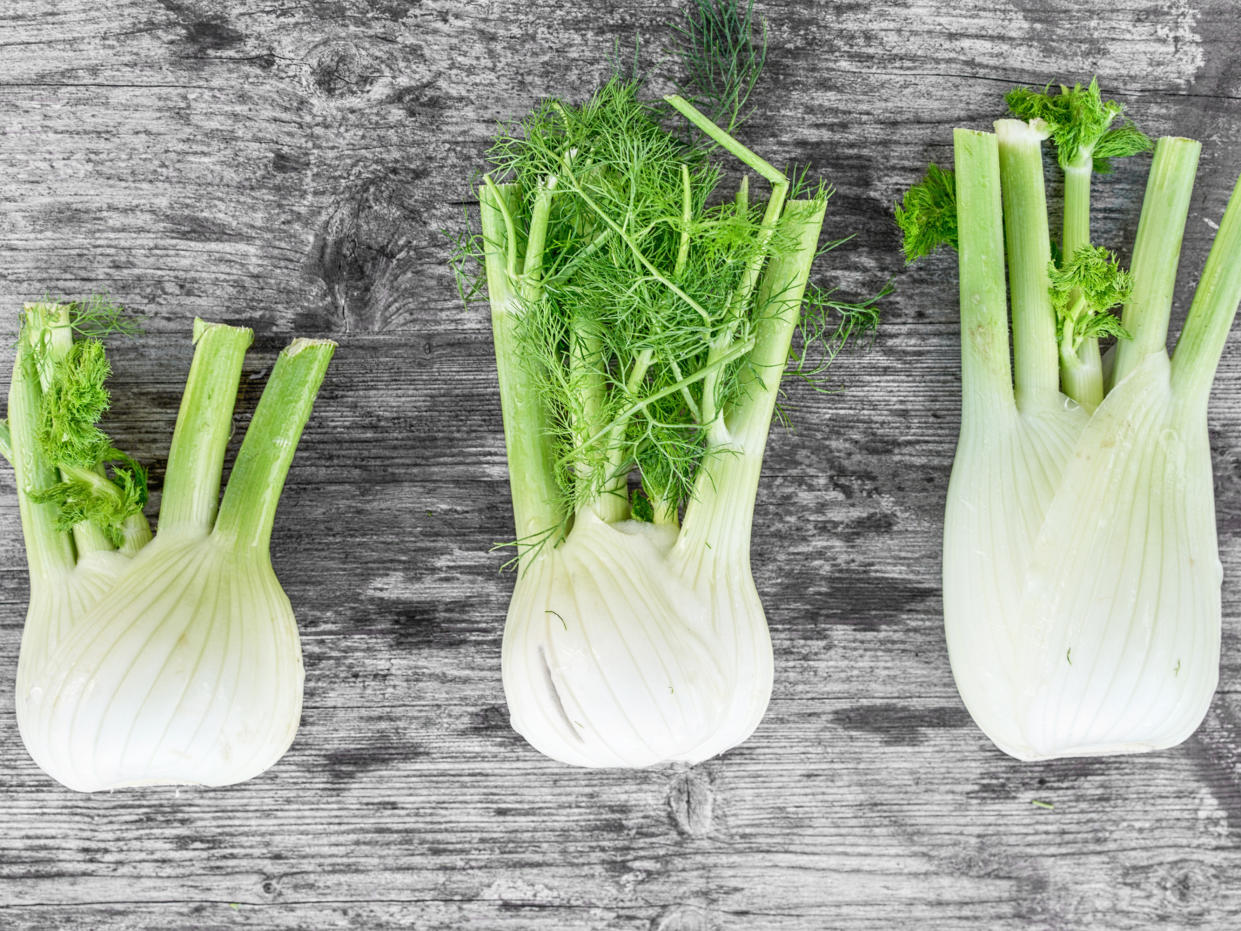7 Reasons Nutritionists Love Fennel

You’ve probably tasted that licorice-esque spiciness of fennel in chicken dishes and teas, but it turns out fennel actually has a whole bunch of benefits beyond being a delicious flavor enhancer. In fact, it’s a medicinal plant, called Foeniculum vulgare, and it’s been used for centuries for its herbal health benefits.
When cooking, you can use fennel in its raw form, as an ingredient in salads or snacks, or it can be roasted with other root vegetables, like carrots or sweet potatoes, or cooked with meats, like chicken and turkey, for a sweet and subtle fresh flavor.
Sounds delicious, right? Well, the health benefits are even better. Here’s why nutritionists love adding fennel to their diets.
It Improves Digestion
Fennel is great for your gut, so drinking fennel tea or munching on some seeds after a meal can totally reset your digestion and make you feel comfortable. “I've found that after meals, a small bit (about 1/4 teaspoon) of fennel seed can help soothe the gut,” explains Staci Gulbin, MS, MEd, RD, LDN.
“This is likely due to fennel's prebiotic properties that help feed probiotic bacteria, help restore balance in the gut microbiome, and in turn help improve gut health,” she explains. Just as we need food, so do probiotics—together prebiotics and probiotics can banish bloat and stomach pangs after a meal.
It Prevents the Munchies
Swapping out your black tea for a cup of fennel tea following a meal may help suppress your appetite, so you’ll have fewer cravings later in the day. “Research shows that fennel consumed in a tea form may be effective as an appetite suppressant,” says Gulbin.
“Therefore, using fennel tea as an in-between meal beverage or an evening beverage after dinner could help to reduce snacking during these times and in turn reduce total daily calorie intake,” she says. That way, you have more control over weight management and your hunger cues.
It’s May Help Reduce Pain
Ditch the ibuprofen and eat a few fennel seeds, instead. “Fennel is not only a flavorful plant, but can also help relieve pain. Research shows that a combination of fennel and vitamin E may be a great pain relief alternative to ibuprofen for those with pain from menstrual cramps and related conditions,” she says. So, when that time of the month rolls around, make sure to keep fennel on your grocery store list.
It’s an Antioxidant
It’s an antioxidant powerhouse. Fennel can help combat oxidative stress and reduce chronic disease risk through its natural antioxidant properties. “This property shows promise for fennel to help lower risk of inflammatory conditions like heart disease, diabetes, and inflammatory skin conditions like eczema, psoriasis or acne,” she adds. That’s pretty impressive for a plant!
It’s an Anti-fungal Remedy
Kick infections to the curb with trusty fennel. “In its oil extract form, fennel can be used as an antifungal or antimicrobial to help treat skin infections,” she explains. What’s more, “with continued study, fennel could potentially be used to replace currently used antifungal treatments that may have greater side effects than the more natural fennel oil extract,” she adds.
It’s Rich in Key Vitamins
One cup of sliced fennel provides nearly 20% of the daily value for vitamin C. “Vitamin C is a water-soluble vitamin, so we need to make sure that we are getting a sufficient amount on a regular basis, because we do not store large quantities of it in the body,” says Summer Yule, MS, RDN.
“Vitamin C is essential for growth and repair of body tissues [and] also helps us to absorb iron from non-heme (plant-based) sources,” she says. And it also keeps your immunity up, to keep you healthy and strong.
Beyond Vitamin C, it’s also high in potassium. “Potassium is one of the key electrolytes in our body, playing a role in the regulation of minerals and fluids which move in and out of body cells,” she says.
Potassium can prevent hypertension (high blood pressure) and provide electrolytes to re-hydrate the body after a workout. Try drinking fennel tea along with your post-workout recovery meal.
It Has a Ton of Fiber
A cup of sliced fennel contains nearly 3 grams of fiber. “Most Americans are not getting enough fiber, so finding delicious ways to include it in the diet is very important for most of us,” says Yule. Fiber benefits the body in many ways. It serves as a prebiotic and keeps bowels regular—which is what everyone wants.

